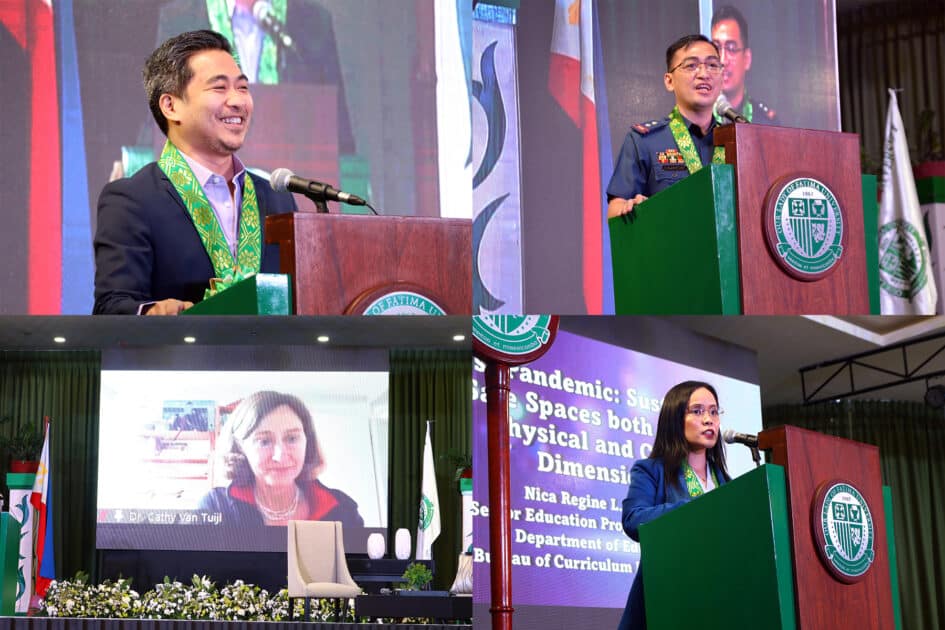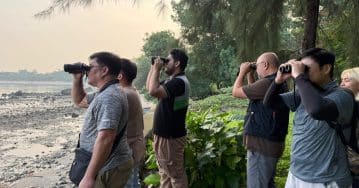When a stranger in school wolf-whistles at another…
When a student feels someone touched him/her/them jokingly but inappropriately…
When one gets ribbed for being part of the LGBTQA community or for identifying as a gender other than his/her/their biological one…
When a person stares at another leeringly that causes undue discomfort to the recipient…
When someone exhibits relentlessness in inviting another to connect on social media or to go out on a date despite repeated declinations…
When one shames another on social media…
When one’s person is diminished by hurtful words in school…
——————
For the person on the receiving end, situations like these have always been “gray areas”—meaning, does one actually have enough reason to raise cause?
And, going over and beyond that, the plot thickens, so-to-speak, when these types of scenarios play out in the school setting where feeling physically safe should be as important as feeling secure psychologically and emotionally.
How can safe learning spaces be propagated? This is the puzzle that the SPACE National Conference on Education sought to answer because studies reveal that a student who “feels safe” within the school community will have a greater sense of belongingness which, in turn, plays a huge role in academic success and motivation.
Held last 18 March 2023 and hosted by Our Lady of Fatima University at its RISE Tower in Valenzuela, Metro Manila, the said SPACE Conference was headlined as “Sustaining Safe Spaces for an Inclusive, Secured, and Empowering Environment for Learning” and where four speakers endeavored to dissect the topic from four different angles leading to a holistic, eye-opening learning experience for the over 400 delegates who attended the event both on-site and online.
Atty. Joseph Noel M. Estrada, Managing Partner of Estrada & Aquino Law, gave a highly interesting crash course on the Philippine laws that touch on the promotion of safe learning spaces such as Republic Act (RA) 7877 on Anti-Sexual Harassment, RA 7610 on Anti-Child Abuse, RA 10175 on Cybercrime Prevention, and the newly enacted RA 11313 on Safe Spaces or more popularly known as the “Bawal and Bastos Law”.
Expounding on what constitutes sexual harassment, Atty. Estrada said that the essence of RA 7877 is “not about the violation of the victim’s sexuality but abuse of power by the offender… manifested through sexually charged conduct or one filled with sexual undertones.”
On the other hand, while power is the core ingredient in RA 7877, Atty. Estrada stated that RA 11313 or the Safe Spaces Act does not require authority, influence or moral ascendancy to factor in for a case to be filed. Rather, said new law zeroes in on gender-based sexual harassment with the premise that all human beings have the right to “equality, security, and safety” whether this be in private or public spaces.

The keynote message of Atty. Estrada was the perfect preface to the topic of Police Captain Jeremiah James Cajayon on “Cyberspace Governance: Security, Stability and Sustainability”. In these times where a significant ratio of interactions occurs in the digital sphere, PCapt Cajayon of the Philippine National Police (PNP) Anti-Cyber Crime Division, shared a wealth of info on what one must guard against in cyberspace in tackling Republic Act No. 10175 or the Cybercrime Prevention Act of 2012.
Touching on cybercrime investigation, digital forensics, cyber patrolling, cyber surveillance, PCapt Cajayon remarked that 48% of cybercrimes involve fraud carried out through phishing (use of email), shmishing (use of SMS), vishing (use of voice call), and quishing (use of QR codes). “Cybercrime is a borderless world,” he said, since the once traditional techniques of burglary, deceptive calls, extortion, and fraud have been taken over by digital- or technology-driven acts of hacking, phishing, online extortion, and internet fraud which all have much widespread, debilitating impact on hapless victims. In fact, he cited that from 2016 to 2022 alone, 126 suicide cases were fueled by cybercrimes. Taking advantage of his brief talk, PCapt Cajayon also mentioned that there are regional and provincial anti-cybercrime offices across the country and a number of these are also found in the National Capital Region, and defined that there are two types of cybercrime— the cyber dependent crime that can only be carried out using Information and Communication Technologies (ICT), and the other one is the cyber enable crime that is really one that uses traditional means but whose reach and impact is increased by the use of ICT. It was likewise quite helpful that he defined the ingredients that must be present in defining an act as Online Libel which he said must be defamatory, malicious, be given publicity, must involve an identifiable victim, and must be committed through a computer or other digital means. As one of his parting shots, PCapt Cajayon shared a very detailed Complainant/Victim Checklist of evidences, documents, perpetrator details, proof of monetary transaction and more which, when presented in full, makes the process of investigation and litigation smoother and faster.
So with negative stimulants issued out through traditional or cyber means, how can learning spaces and learners be kept safe? That was the puzzle that Dr. Catrina van Tuijl sought to break down. This Professor of the Saxion University of Applied Sciences in the Netherlands presented her talk via Zoom platform on “Social-emotional learning in order to provide a safe learning space,” and began by stating that the primary goal of teachers is to know and understand students well as that would pave the way in knowing how to foster for them a sense of belongingness. “Children’s school adjustment is more than academic functioning,” she underscored, as it is actually composed of a three-pronged approach: academic functioning, social functioning, and behavioral functioning. Academic functioning involves skills acquisition and motivation. Social functioning encompasses peer relations and adult relations that would impact on having a sense of belonging, peer acceptance, and quality of friendships. And behavioral functioning includes role behaviors and self-regulation of attention and emotion which, if addressed correctly, lead to a student who follows rules, knows how to delay gratification, and how to control impulses. Dr. Tuijl likened a school community to a mini society where children learn how to control their behavior in a variety of day-to-day situations, how to interact well with teachers and classmates, and how to behave responsibly. All of these constitute the concept of social-emotional learning, she said.
Dr. Tuijl presented the CASEL Model of 2013 as a template for nurturing social and emotional learning. CASEL is the Collaborative of Academic, Social and Emotional Learning which illustrates how the positive stimulation within the community, families/guardians, school, and classroom is key in promoting self-awareness, self-management, social awareness, relationship skills, and responsible decision-making. Naturally, these would not be possible without the influence of the school in terms of SEL (social-emotional learning) instruction, setting the best classroom climate, culture/practices/policies, authentic partnerships, and aligned learning opportunities.

In putting the CASEL Model to work, Dr. Tuijl said SEL training for both students and teachers is salient. There should be a wealth of opportunities to demonstrate and practice SEL that is culturally-relevant. However, Dr. Tuijl underscored that it is crucial for schools to implement with like-mindedness among teachers and staff: one understanding of SEL, a common language, alignment and consistency in setting rules and routines, positive support of appropriate behavior, and SEL training and supervision. Having said that, Dr. Tuijl emphasized the “teacher’s invisible hand” and the part it plays on how well children fare with their peers.
The last speaker of the conference was Professor Nica Regine Jaucian, Senior Education Program Specialist from the Department of Education (DepEd), who discussed the various curriculum-related initiatives of DepEd in sustaining safe spaces both in the physical and cyber dimensions. Prof. Jaucian began by citing a UNESCO statistic that an average of 246 million learners experience violence each school year, which is why the entry of RA 11313 or the “Bawal ang Bastos Law” is a welcome addition to Philippine laws that aim to protect the youth with Prof. Jaucian specifically calling attention to Article V of RA 11313 which deals with gender-based sexual harassment in educational and training institutions. However, she revealed the unfortunate prevailing conditions in the country’s public school system wherein there is a ratio of one Registered Guidance Counsellor (RGC) to 8,245 learners (2022 statistic), when the ideal ratio is one RGC to 5,000 learners. Having to contend with a challenge such as this, Prof. Jaucian elaborated on the various channels and efforts that are made available to protect learners in their learning space. She referred to DepEd Order No. 40 s. 2012 or the Child Protection Policy, and introduced the country’s Council for the Welfare of Children which is a coordinating entity of multiple agencies whose mandate is to “formulate, review, monitor, and evaluate all laws, policies, issuances, and programs on children”. Then, she points to Article 218 of the Family Code that says an individual (other than the parent) may have special parental authority and responsibility over a child who is placed under his supervision, instruction and custody.
Citing that the DepEd applies rights-based education in Basic Education which is composed of the right to access education, the right to quality education, and the right to respect and wellbeing in the learning environment, Prof. Jaucian underscored the latter by breaking it down to the following: the respect for identity, the right to participation, and the right to integrity of body and mind in a child-friendly, safe, and healthy learning environment.
Prof. Jaucian spoke lengthily on DepEd’s partnership with Google on the Be Internet Awesome (BIA) Curriculum designed for Grades 1 to 6 and Junior High School. BIA has five modules that educate children on how to stay safe while on the internet: Share with Care talks about protecting oneself and one’s reputation while online; Don’t Fall for Fake alerts the youth against phishing, fraud, and scams; Secure Your Secrets is all about guarding one’s privacy and security online; It’s Cool to Be Kind champions positively while online, and When in Doubt, Talk It Out is about having courage on the internet. Then, in connection, she also breezed through the DepEd K-12 alignment with Google whereby topics on safe spaces are tackled in subjects such as Edukasyonsa Pagpapakatao, Edukasyon sa Pangtahanan at Pangkabuhayan (EPP), Araling Panlipunan, and English, among others. Other worthwhile DepEd initiatives are the: Be a Buddy Not a Bully Campaign; Breaking the Chain of Violence Against Children, a training course for DepEd Child Protection Specialists, and the Learners Telesafe Contact Center Helpline (https://www.deped.gov.ph/learners-telesafe-contact-center/).
March 18th was full of “aha” moments— from legislation, to cybercrime prevention, to social-emotional learning, and to DepEd curriculum alignment, SPACE delegates obtained a well-rounded understanding on how to create and sustain safe spaces for learners. The hosting of this national conference was led by the Basic Education Department and its Administrator Rafael Enriquez, with support from the College of Education, College of Criminal Justice, and the Graduate School duly represented by their respective Deans: Dr. Elmer Hidalgo, Dr. John David, and Dr. Heracleo Lagrada. OLFU’s Center for Professional Development and Academic Partnership (CPDAP) headed by its Manager, Dr. Rodehlia Macaspac, helped oversee the planning and implementation, as well.
Also lending their presence and special messages were OLFU Administrators: Dr. Caroline Marian Enriquez, President; Don August Santos, Executive Vice President, and Dr. Heracleo Lagrada, Vice President for Academic Affairs.




